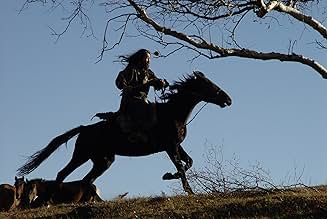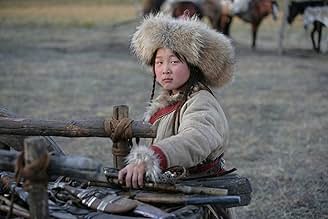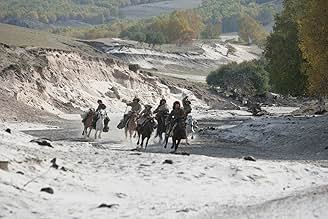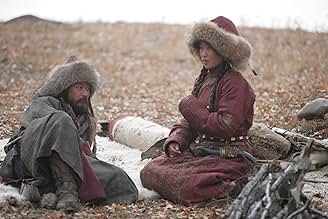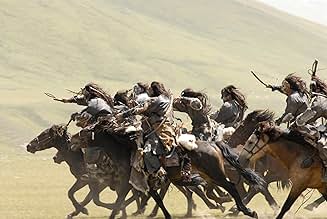CALIFICACIÓN DE IMDb
7.2/10
51 k
TU CALIFICACIÓN
La historia relata los primeros años de vida de Genghis Khan, que fue esclavo antes de conquistar medio mundo en 1206.La historia relata los primeros años de vida de Genghis Khan, que fue esclavo antes de conquistar medio mundo en 1206.La historia relata los primeros años de vida de Genghis Khan, que fue esclavo antes de conquistar medio mundo en 1206.
- Dirección
- Guionistas
- Elenco
- Nominado a 1 premio Óscar
- 16 premios ganados y 13 nominaciones en total
Liya Ai
- Oelun - Temudjin's Mother
- (as Aliya)
Baasanjav Mijid
- Esugei - Temudjin's Father
- (as Ba Sen)
Ayuur
- Sorgan-Shira
- (as A You Er)
Huntun Batu
- Altan
- (as Hong Jong Ba Tu)
Deng Ba Te Er
- Daritai
- (as E Er Deng Ba Te Er)
Su Ya La Su Rong
- Girkhai
- (as Su You Le Si Ren)
- Dirección
- Guionistas
- Todo el elenco y el equipo
- Producción, taquilla y más en IMDbPro
Opiniones destacadas
'Mongol,' the Russian-directed semi-historical epic (big emphasis on the semi- here) shot for $20 million in China (and Mongolia and Kazhakistan) with a multi-national cast and crew and Japanese and Chinese stars, purports to depict the first thirty-five years of the life of the emperor Genghis Khan. I say "purports," because not much is known of this period and even in depicting legend, Bodrov chooses to leave out many of the essential connectives that make a good story (or fairy tale or legend). Temudjin, as the young super-Khan is called, is a yoked prisoner, for example, awaiting execution; then, inexplicably, the yoke is off and he's free. He sinks through thin ice deep into the frozen water below; then, inexplicably, he's lying on land and getting rescued. He is languishing in a Chinese prison--his face seeming to acquire a patina of dust and sand (I liked that part: Bodrov excels at faces and tableaux); then he's miraculously found by his faithful wife Borte. She throws him a key and sets him free. Then, inexplicably, he is leading a vast army to defeat his arch rival. Over and over, how we get from point A to point B is left on the cutting-room floor. This is enjoyable as spectacle but unsatisfying from other standpoints.
How Genghis Khan got to be Genghis Khan, in short, is one thing this movie doesn't begin to try to explain. Could anyone? That I don't know; but 'Mongol' presents its biographical narrative without the connectives that make sense of a life. Despite lots of dramatic scenes with snappy dialog, striking images, and above all computer-assisted battles with crunching bones and crackling arrows and ringing swords, the film has an epic style without epic themes because its great issues are not so much resolved as abruptly, magically removed. This may in fact be more an epic love story than anything else. It is that in the backhanded way the 'Odyssey' is a love story, because, though Temudjin is away from Borte a lot of the time as Odysseus is mostly away from Ithaka and Penelope, 'Mongol's' opening sequence gives Borte a primary importance, because she (as played by Bayertsetseg Erdenebat), belonging to another tribe, a liberated young woman of the twelfth century, isn't chosen by but chooses Temudjin when he's nine years old and she's ten. It's not supposed to be that way--and maybe it wasn't; it seems a bit implausible. Temudjin is traveling with his Khan (tribal chieftain) father (Ba Sen) on their way to placate another tribe by choosing the boy's wife from their girls. When they don't, the father is promptly poisoned by the other tribe. And its leader, Targutai (Amadu Mamadakov), vows to kill Temudjin--but not for a year or so, because "Mongols don't kill children."
Well, what Mongols do or don't do seems up for grabs, and probably at the time, historically, "Mongol" itself must have been a rather vague concept. In fact that is another running theme: what's a Mongol? What are their primary values? There is no satisfactory answer, though killing and stealing are advanced as major concepts.
Surprisingly, since not too many are "to the right of Genghis Khan," and since he succeeds in wiping out all his enemies, Temudjin as played (as an adult) by the imposing Tadanobu Asano is a gentle-faced, zen-like fellow who's a strong advocate of fair play. Tadanobu, along with the somewhat over-histrionic Chinese actor Honglai Sun as Jamukha, his childhood blood brother and eventual arch rival, are both impressive. But the real star, with some substantial help from computer-generated effects, is the vast landscape of steppe, snow, mountain, and sky that dominates many scenes. With effective use of lenses and light, the filmmakers have created an epic look, and it's this, plus the authoritative acting, that make this film worth viewing--but only if you like this kind of thing and if you don't mind that you're not going to emerge from it with any historical knowledge. Said to be the first of a trilogy. One will approach the sequels with a certain reserve.
Shown as part of the San Francisco International Film Festival April-May 2008 and in US theatrical release June 2008.
How Genghis Khan got to be Genghis Khan, in short, is one thing this movie doesn't begin to try to explain. Could anyone? That I don't know; but 'Mongol' presents its biographical narrative without the connectives that make sense of a life. Despite lots of dramatic scenes with snappy dialog, striking images, and above all computer-assisted battles with crunching bones and crackling arrows and ringing swords, the film has an epic style without epic themes because its great issues are not so much resolved as abruptly, magically removed. This may in fact be more an epic love story than anything else. It is that in the backhanded way the 'Odyssey' is a love story, because, though Temudjin is away from Borte a lot of the time as Odysseus is mostly away from Ithaka and Penelope, 'Mongol's' opening sequence gives Borte a primary importance, because she (as played by Bayertsetseg Erdenebat), belonging to another tribe, a liberated young woman of the twelfth century, isn't chosen by but chooses Temudjin when he's nine years old and she's ten. It's not supposed to be that way--and maybe it wasn't; it seems a bit implausible. Temudjin is traveling with his Khan (tribal chieftain) father (Ba Sen) on their way to placate another tribe by choosing the boy's wife from their girls. When they don't, the father is promptly poisoned by the other tribe. And its leader, Targutai (Amadu Mamadakov), vows to kill Temudjin--but not for a year or so, because "Mongols don't kill children."
Well, what Mongols do or don't do seems up for grabs, and probably at the time, historically, "Mongol" itself must have been a rather vague concept. In fact that is another running theme: what's a Mongol? What are their primary values? There is no satisfactory answer, though killing and stealing are advanced as major concepts.
Surprisingly, since not too many are "to the right of Genghis Khan," and since he succeeds in wiping out all his enemies, Temudjin as played (as an adult) by the imposing Tadanobu Asano is a gentle-faced, zen-like fellow who's a strong advocate of fair play. Tadanobu, along with the somewhat over-histrionic Chinese actor Honglai Sun as Jamukha, his childhood blood brother and eventual arch rival, are both impressive. But the real star, with some substantial help from computer-generated effects, is the vast landscape of steppe, snow, mountain, and sky that dominates many scenes. With effective use of lenses and light, the filmmakers have created an epic look, and it's this, plus the authoritative acting, that make this film worth viewing--but only if you like this kind of thing and if you don't mind that you're not going to emerge from it with any historical knowledge. Said to be the first of a trilogy. One will approach the sequels with a certain reserve.
Shown as part of the San Francisco International Film Festival April-May 2008 and in US theatrical release June 2008.
Mongol (2007), was co-written and directed by Sergei Bodrov. It was filmed in Kazakhstan, and is in Mongolian with English subtitles. It's a biography of Ghenghis Khan, especially his rise to power. The movie quotes an old proverb: "Do not scorn a weak cub; he may become a brutal tiger." Actually, as portrayed in the film, Ghenghis Khan was hardly a weak cub, even as a young child. However, he certainly became a tiger when grown--whether brutal or just powerful is another question.
The film is more or less consistent with the Wikipedia report of Khan's life. He was captured and enslaved as a boy, but managed to escape and eventually conquer his local tribal enemies. (The movie portrays Ghenghis Khan as a young boy and then a young man. The film ends before we can see Khan's eventual consolidation of his huge empire.)
There is (literally) a cast of thousands. The movie is colorful, the battle scenes are graphic, and men, women, and horses all look great. The acting was excellent, especially that of Odnyam Odsuren as the young Ghenghis Khan, Tadanobu Asano as the grown man, and the beautiful Khulan Chuluun as Börte, his wife.
For political and/or esthetic reasons, Khan is portrayed as a man who brought the warring Mongolian tribes together, and as a lawgiver and just ruler. I don't have enough knowledge of the period to know whether the people of his empire would have taken this view. However, this is a movie, not a Ph.D. dissertation, so I accepted it as an action-filled and enjoyable--if not profound--film.
We saw this film at the excellent Rochester High Falls International Film Festival. Because of the sweeping nature of the battles, and the glorious shots of the landscape, this movie will lose a lot on DVD. Try to see it in a theater, preferably one with a large screen.
The film is more or less consistent with the Wikipedia report of Khan's life. He was captured and enslaved as a boy, but managed to escape and eventually conquer his local tribal enemies. (The movie portrays Ghenghis Khan as a young boy and then a young man. The film ends before we can see Khan's eventual consolidation of his huge empire.)
There is (literally) a cast of thousands. The movie is colorful, the battle scenes are graphic, and men, women, and horses all look great. The acting was excellent, especially that of Odnyam Odsuren as the young Ghenghis Khan, Tadanobu Asano as the grown man, and the beautiful Khulan Chuluun as Börte, his wife.
For political and/or esthetic reasons, Khan is portrayed as a man who brought the warring Mongolian tribes together, and as a lawgiver and just ruler. I don't have enough knowledge of the period to know whether the people of his empire would have taken this view. However, this is a movie, not a Ph.D. dissertation, so I accepted it as an action-filled and enjoyable--if not profound--film.
We saw this film at the excellent Rochester High Falls International Film Festival. Because of the sweeping nature of the battles, and the glorious shots of the landscape, this movie will lose a lot on DVD. Try to see it in a theater, preferably one with a large screen.
I saw this last week at the Toronto film festival and loved it. Many of the people in my group did not want to see it because they were not interested in the subject matter and ended up loving the film. It seemed to be the overall favorite of the group (we saw 12 films in Toronto). There is a fair amount of blood so if one is bothered by violence, you may not enjoy it. In some ways it reminded me of Braveheart because you learned about the history, but there was also beautiful cinematography, landscapes, and very well done battle scenes. This film could possibly be in the running for the best foreign film Oscar.
Saw this flick last night and I really loved it. As I understand it many Mongolians hate the film for historical inaccuracies and a heavily accented cast (the lead is from Japan) but if you are unfamiliar with the area and culture you'll find a great story that brings a new light to a historical figure that a surprisingly large portion of the world reviles.
The cinematography is gorgeous and the subtitle script is excellent.
What really makes this film great are the performances and the action scenes.
When he gains followers and unites Mongolia you understand why.
Hopefully the film will get people to read more about the original man and discover the historical inaccuracies.
Of course as historical accuracies go it much more accurate then Elizabeth: The Golden Age.
The cinematography is gorgeous and the subtitle script is excellent.
What really makes this film great are the performances and the action scenes.
When he gains followers and unites Mongolia you understand why.
Hopefully the film will get people to read more about the original man and discover the historical inaccuracies.
Of course as historical accuracies go it much more accurate then Elizabeth: The Golden Age.
To the above two comments.
You know how they say history was written by the victors? That's true for everyone but the Mongols. Most of their history was written by the Chinese, Russians, Arabs, and other conquered peoples who had an interest in perpetuating Genghis Khan = bloodthirsty savage.
The movie is based on one of the few sources about Genghis khan written in Mongolian. It's called the secret history of the Mongols and was written shortly after he died as a record for the Mongolian royal family. He was just a chieftain's's son of a very minor tribe. That's what makes this story so impressive, he didn't start out as a king or a prince with a huge army, like Alexander. Everything he had, he had to earn. He didn't get to be Genghis Khan until he was in his 30's. He was always aware of how victory wasn't assured but had to be paid for with planning and strategy. He wasn't a saint by any means but he wasn't an unthinking savage. This movie is actually meant to be the first in a trilogy with the second one probably detailing his conquest of north china and the third the conquest of the Khwarezim empire in Iran and Afghanistan.
This is an approach that I like because the Alexander movie died on account of it trying to condense all of his conquests into one movie.
You know how they say history was written by the victors? That's true for everyone but the Mongols. Most of their history was written by the Chinese, Russians, Arabs, and other conquered peoples who had an interest in perpetuating Genghis Khan = bloodthirsty savage.
The movie is based on one of the few sources about Genghis khan written in Mongolian. It's called the secret history of the Mongols and was written shortly after he died as a record for the Mongolian royal family. He was just a chieftain's's son of a very minor tribe. That's what makes this story so impressive, he didn't start out as a king or a prince with a huge army, like Alexander. Everything he had, he had to earn. He didn't get to be Genghis Khan until he was in his 30's. He was always aware of how victory wasn't assured but had to be paid for with planning and strategy. He wasn't a saint by any means but he wasn't an unthinking savage. This movie is actually meant to be the first in a trilogy with the second one probably detailing his conquest of north china and the third the conquest of the Khwarezim empire in Iran and Afghanistan.
This is an approach that I like because the Alexander movie died on account of it trying to condense all of his conquests into one movie.
¿Sabías que…?
- TriviaDirector Sergei Bodrov and Production Designer Dashi Namdakov visited Mongolia's chief shaman in the capital city of Ulan Bator, so that they could ask permission to film a movie about Genghis Khan's life. The shaman told them that of all the people who have talked about making such a film, they were the only ones to ask his permission.
- ErroresThe Mongolian tribes, including the hordes that conquered their vast empire, rode on a very peculiar race of horses, stocky build, with relatively short legs and a large head. The horses used in the movie look like ordinary western horses
- ConexionesFeatured in The 80th Annual Academy Awards (2008)
- Bandas sonorasBeginning
Composed By Tuomas Kantelinen
Performed by Hamburg Film Orchestra, The London Session Orchestra, One Orchestra, Altan Urag
© 2008 X-Filme Creative Pool GmbH.
(p) 2008 Kinofabrika GmbH & Tuomas Kantelinen Ensemble.
Selecciones populares
Inicia sesión para calificar y agrega a la lista de videos para obtener recomendaciones personalizadas
Detalles
- Fecha de lanzamiento
- Países de origen
- Idiomas
- También se conoce como
- Mongol: The Rise of Genghis Khan
- Locaciones de filmación
- Inner Mongolia, China(location)
- Productoras
- Ver más créditos de la compañía en IMDbPro
Taquilla
- Presupuesto
- USD 18,000,000 (estimado)
- Total en EE. UU. y Canadá
- USD 5,705,761
- Fin de semana de estreno en EE. UU. y Canadá
- USD 135,326
- 8 jun 2008
- Total a nivel mundial
- USD 26,527,510
- Tiempo de ejecución2 horas 6 minutos
- Color
- Mezcla de sonido
- Relación de aspecto
- 2.35 : 1
Contribuir a esta página
Sugiere una edición o agrega el contenido que falta

Principales brechas de datos
What was the official certification given to Mongol (2007) in Brazil?
Responda






